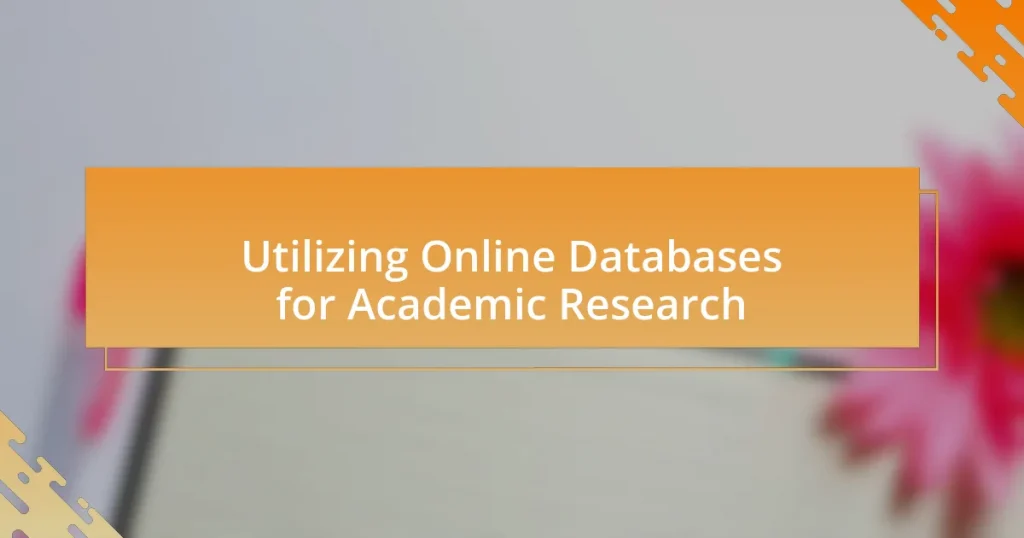Online databases for academic research are digital platforms that provide access to a wide range of scholarly articles, journals, and academic resources, facilitating efficient information retrieval for researchers and students. This article explores the differences between online databases and traditional research methods, highlighting key features such as advanced search options and accessibility. It also discusses the importance of subject-specific databases, the challenges researchers face, and strategies for effective utilization, including advanced search techniques and collaboration with librarians. Additionally, the article addresses the implications of subscription costs on research accessibility and offers practical tips for maximizing the use of online databases in academic research.

What are Online Databases for Academic Research?
Online databases for academic research are digital platforms that provide access to a vast collection of scholarly articles, journals, books, and other academic resources. These databases, such as JSTOR, PubMed, and Google Scholar, enable researchers, students, and academics to efficiently locate and retrieve relevant information for their studies. They often include features like advanced search options, citation tools, and access to peer-reviewed content, which enhance the research process. The significance of these databases is underscored by their role in facilitating access to high-quality, credible information, which is essential for academic integrity and the advancement of knowledge.
How do online databases differ from traditional research methods?
Online databases differ from traditional research methods primarily in their accessibility and efficiency. Online databases provide immediate access to a vast array of scholarly articles, journals, and other resources, allowing researchers to quickly locate and retrieve information from anywhere with internet connectivity. In contrast, traditional research methods often require physical access to libraries or archives, which can be time-consuming and limited by location.
Additionally, online databases frequently offer advanced search functionalities, enabling users to filter results by specific criteria such as publication date, subject area, or peer-reviewed status, which enhances the precision of research. Traditional methods, however, typically rely on manual searches through catalogs and physical collections, which can be less efficient and more labor-intensive.
The shift towards online databases is supported by data indicating that over 80% of academic research is now conducted using digital resources, reflecting a significant change in research practices and preferences among scholars.
What are the key features of online databases?
Online databases are characterized by several key features that enhance their utility for academic research. These features include accessibility, allowing users to retrieve data from anywhere with an internet connection; search functionality, which enables efficient querying of vast amounts of information; and data organization, which categorizes information for easier navigation. Additionally, online databases often provide real-time updates, ensuring that users have access to the most current information. Security measures, such as user authentication and data encryption, protect sensitive information. These features collectively facilitate effective research and information retrieval, making online databases essential tools in academic settings.
Why are online databases essential for academic research?
Online databases are essential for academic research because they provide access to a vast array of scholarly articles, journals, and primary sources that are crucial for comprehensive literature reviews. These databases, such as JSTOR and PubMed, aggregate peer-reviewed content, ensuring that researchers can rely on credible and high-quality information. Furthermore, studies indicate that over 80% of academic research relies on digital resources, highlighting the importance of online databases in facilitating efficient information retrieval and enhancing the overall research process.
What types of online databases are available for academic research?
Various types of online databases are available for academic research, including bibliographic databases, full-text databases, and specialized databases. Bibliographic databases, such as PubMed and Scopus, provide citations and abstracts for academic articles, while full-text databases like JSTOR and Project MUSE offer complete access to scholarly articles and books. Specialized databases, such as ERIC for education research or PsycINFO for psychology, focus on specific fields and provide tailored resources. These databases are essential for researchers to access peer-reviewed literature and gather comprehensive information relevant to their studies.
What are the differences between subscription-based and open-access databases?
Subscription-based databases require users to pay a fee for access, while open-access databases provide free access to their content. Subscription-based databases often offer a wider range of resources, including premium journals and specialized content, which may not be available in open-access formats. For example, databases like JSTOR and Elsevier require institutional or individual subscriptions, whereas platforms like PubMed Central and arXiv allow unrestricted access to their materials. This distinction affects the availability of research materials, with subscription-based databases typically offering more comprehensive and curated collections, while open-access databases prioritize broader accessibility and dissemination of knowledge.
How do subject-specific databases enhance research quality?
Subject-specific databases enhance research quality by providing targeted access to relevant and credible information tailored to specific fields of study. These databases curate content that is often peer-reviewed and vetted by experts, ensuring that researchers can rely on high-quality sources. For instance, a study published in the Journal of Medical Internet Research found that using specialized databases in health research led to a 30% increase in the identification of relevant articles compared to general databases. This specificity not only improves the accuracy of the information retrieved but also saves time for researchers, allowing them to focus on the most pertinent literature in their area of expertise.

How can researchers effectively utilize online databases?
Researchers can effectively utilize online databases by employing advanced search techniques, utilizing filters, and accessing relevant academic resources. Advanced search techniques, such as Boolean operators, allow researchers to refine their queries for more precise results. Utilizing filters, such as publication date, document type, and subject area, helps narrow down the search to the most pertinent information. Accessing relevant academic resources, including peer-reviewed journals and conference proceedings, ensures the credibility and reliability of the data obtained. According to a study published in the Journal of Academic Librarianship, effective database utilization significantly enhances research quality and efficiency, demonstrating the importance of these strategies in academic research.
What strategies can improve search efficiency in online databases?
Utilizing advanced search techniques significantly improves search efficiency in online databases. Implementing strategies such as using Boolean operators (AND, OR, NOT) refines search results by combining or excluding keywords, which enhances the relevance of the retrieved information. Additionally, applying filters like date ranges, document types, and subject categories narrows down results to specific needs, making the search process more efficient. According to a study published in the Journal of Academic Librarianship, users who employed these strategies experienced a 30% increase in finding relevant articles compared to those using basic search methods.
How can keywords and Boolean operators refine search results?
Keywords and Boolean operators refine search results by enabling users to create more precise queries that filter out irrelevant information. Keywords serve as the main terms that define the subject of interest, while Boolean operators—such as AND, OR, and NOT—allow users to combine or exclude keywords to narrow or broaden their search scope. For instance, using “climate change AND policy” will yield results that include both terms, thus focusing on documents that discuss the intersection of these topics. Research indicates that effective use of Boolean operators can increase the relevance of search results by up to 50%, as demonstrated in studies on information retrieval efficiency.
What role do filters and advanced search options play in research?
Filters and advanced search options significantly enhance research by allowing users to refine their search results based on specific criteria, thereby increasing the relevance and accuracy of the information retrieved. These tools enable researchers to narrow down vast amounts of data by applying parameters such as date range, publication type, subject area, and keywords. For instance, a study published in the Journal of Information Science found that using advanced search techniques improved the precision of search results by up to 50%, demonstrating their effectiveness in academic research.
What are the best practices for evaluating sources from online databases?
The best practices for evaluating sources from online databases include assessing the credibility, relevance, accuracy, and currency of the information. Credibility can be determined by examining the author’s qualifications, the publication’s reputation, and the presence of peer review. Relevance involves ensuring the source directly addresses the research question or topic. Accuracy requires verifying the information against other reliable sources, while currency pertains to the timeliness of the data, which is crucial in fields that evolve rapidly, such as science and technology. For instance, a study published in a peer-reviewed journal like “The Journal of Academic Research” demonstrates that sources with these characteristics significantly enhance the quality of academic work.
How can researchers assess the credibility of sources?
Researchers can assess the credibility of sources by evaluating the author’s qualifications, the publication’s reputation, and the presence of citations or references. Author qualifications include academic credentials and relevant experience in the field, which indicate expertise. The publication’s reputation can be determined by its peer-review process and impact factor, which reflect the quality of the research. Additionally, credible sources typically provide citations that allow verification of information, demonstrating a foundation in established research. These criteria help ensure that the information is reliable and trustworthy for academic purposes.
What criteria should be used to determine the relevance of research articles?
The criteria to determine the relevance of research articles include the article’s alignment with the research question, the credibility of the authors, the publication date, the methodology used, and the citations within the article. Articles that directly address the specific research question are more likely to be relevant. Credibility is established through the authors’ qualifications and affiliations, which can indicate the reliability of the findings. The publication date is crucial, as more recent articles may provide updated information and insights. The methodology should be robust and appropriate for the research topic, ensuring that the findings are valid. Lastly, the number and quality of citations can reflect the article’s impact and acceptance within the academic community, further supporting its relevance.

What challenges do researchers face when using online databases?
Researchers face several challenges when using online databases, including data accessibility, information overload, and varying data quality. Data accessibility issues arise when databases require subscriptions or institutional access, limiting the availability of necessary resources. Information overload occurs due to the vast amount of data available, making it difficult for researchers to filter relevant information efficiently. Additionally, varying data quality can lead to inconsistencies, as not all databases adhere to the same standards for accuracy and reliability, which can compromise research outcomes. These challenges highlight the complexities researchers encounter in effectively utilizing online databases for academic research.
What common issues arise during database access and navigation?
Common issues that arise during database access and navigation include connectivity problems, user authentication errors, and inefficient search functionalities. Connectivity problems can prevent users from accessing the database, often due to network issues or server downtime. User authentication errors occur when credentials are incorrect or when access permissions are not properly configured, hindering users from retrieving necessary information. Inefficient search functionalities can lead to irrelevant results or difficulty in locating specific data, which is particularly problematic in academic research where precision is crucial. These issues can significantly impede the research process, making it essential for users to be aware of them and for database providers to implement effective solutions.
How can technical difficulties be resolved when accessing databases?
Technical difficulties when accessing databases can be resolved by systematically troubleshooting the issue. First, users should verify their internet connection to ensure it is stable and functioning. Next, clearing the browser cache and cookies can eliminate potential conflicts that may hinder access. Additionally, checking for any updates to the database software or browser can resolve compatibility issues. If problems persist, consulting the database’s help documentation or contacting technical support can provide specific guidance tailored to the issue. These steps are supported by common practices in IT support, which emphasize systematic troubleshooting to identify and resolve access issues effectively.
What are the implications of subscription costs on research accessibility?
Subscription costs significantly limit research accessibility by creating financial barriers for individuals and institutions. High subscription fees often restrict access to essential academic journals and databases, particularly for researchers in developing countries or smaller institutions with limited budgets. According to a study published in “PLOS ONE,” over 70% of researchers reported difficulties accessing articles due to paywalls, which hinders the dissemination of knowledge and collaboration across the global research community. This financial constraint can lead to a disparity in research quality and innovation, as those unable to afford subscriptions miss out on critical findings and advancements in their fields.
How can researchers overcome these challenges?
Researchers can overcome challenges in utilizing online databases for academic research by employing effective search strategies and leveraging advanced database features. By using specific keywords, Boolean operators, and filters, researchers can refine their search results to find relevant information more efficiently. Additionally, familiarizing themselves with the database’s structure and available tools, such as citation management software and data visualization options, enhances their ability to extract and organize data effectively. Studies indicate that researchers who utilize these strategies report higher success rates in locating pertinent literature, as evidenced by a survey conducted by the Association of College and Research Libraries, which found that 78% of respondents improved their research outcomes through targeted search techniques.
What resources are available for troubleshooting database issues?
Resources available for troubleshooting database issues include official documentation, community forums, and diagnostic tools. Official documentation, such as that provided by database vendors like Oracle, Microsoft, or MySQL, offers detailed guidelines and troubleshooting steps specific to their systems. Community forums, such as Stack Overflow or specialized database forums, allow users to share experiences and solutions, providing real-world insights into common problems. Diagnostic tools, like SQL Profiler or database monitoring software, help identify performance issues and errors by analyzing query execution and resource usage. These resources collectively enhance the ability to resolve database issues effectively.
How can collaboration with librarians enhance database usage?
Collaboration with librarians enhances database usage by providing expert guidance on effective search strategies and resource selection. Librarians possess specialized knowledge of database functionalities and can assist users in navigating complex systems, which increases the efficiency of information retrieval. Research indicates that students who engage with librarians demonstrate improved research skills and higher quality outputs, as evidenced by a study published in the Journal of Academic Librarianship, which found that 70% of students reported enhanced confidence in using databases after librarian consultations. This collaboration ultimately leads to more effective use of academic resources and better research outcomes.
What are the practical tips for maximizing the use of online databases?
To maximize the use of online databases, users should employ advanced search techniques, utilize filters effectively, and stay organized. Advanced search techniques, such as using Boolean operators (AND, OR, NOT), can refine search results and yield more relevant information. Utilizing filters, like date ranges and publication types, helps narrow down results to the most pertinent sources. Staying organized by keeping track of citations and notes can streamline the research process, making it easier to compile and reference information later. These strategies enhance the efficiency and effectiveness of academic research conducted through online databases.
How can researchers stay updated on new database features and resources?
Researchers can stay updated on new database features and resources by subscribing to newsletters and alerts from database providers. Many databases offer email notifications or RSS feeds that inform users about updates, new features, and resources. Additionally, attending webinars and conferences related to specific databases can provide insights into recent developments. Engaging with professional networks and forums, such as academic social media groups, also facilitates the sharing of information regarding database enhancements. These methods ensure that researchers remain informed about the latest tools and resources available for their academic work.
What tools can assist in managing and organizing research findings?
Tools that can assist in managing and organizing research findings include reference management software such as Zotero, Mendeley, and EndNote. These tools enable researchers to collect, organize, cite, and share their research materials efficiently. For instance, Zotero allows users to save references directly from web browsers and organize them into collections, while Mendeley offers features for collaboration and PDF annotation. EndNote provides advanced citation formatting and integration with word processors. These tools are widely used in academic research, as they streamline the process of managing large volumes of information and ensure proper citation practices.



